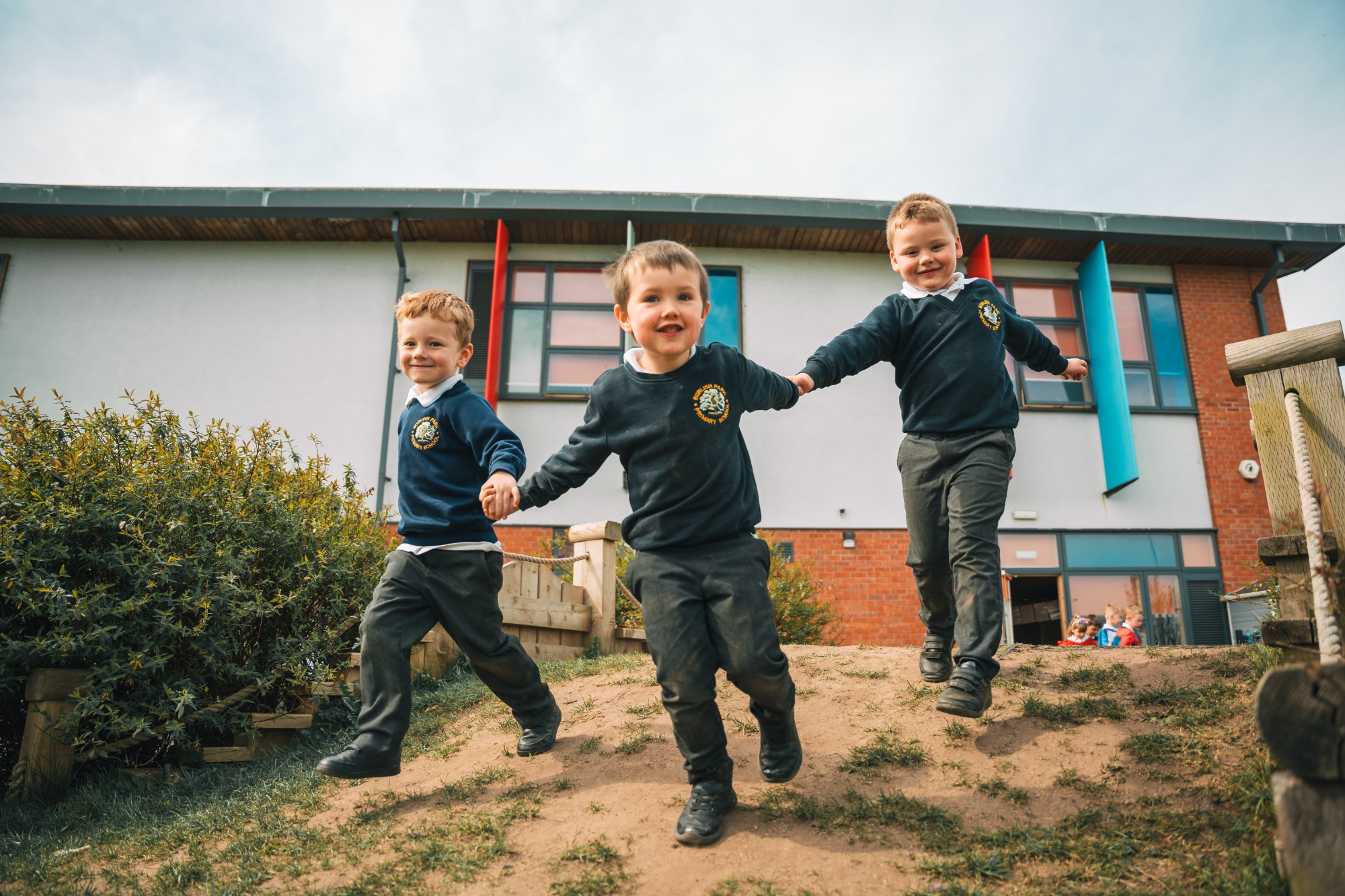Mental Health and Wellbeing

At Burlish Park Primary School, we believe in promoting positive mental health and emotional wellbeing to ensure that the school is a community where everyone feels able to thrive. Our school ethos and values underpin everything that we do.
Who has mental health?
We all have mental health – some people call this emotional health or wellbeing.
What is mental health?
The World Health Organisation defines mental health as a state of wellbeing in which every individual achieves their potential, copes with the normal stresses of life, works productively and fruitfully, and is able to make a contribution to their community. Mental health includes our emotional, psychological and social wellbeing. It affects how we think, feel and act.
Good mental health and wellbeing is just as important as good physical health. Like physical health, mental health can range across a spectrum from healthy to unwell; it can fluctuate on a daily basis and change over time.
Most children grow up mentally healthy, but surveys suggest that more children and young people have problems with their mental health today than 30 years ago. It is thought that this is probably because of changes in the way that we live now and how that affects the experience of growing up.
What helps?
Things that can help keep children and young people mentally well include:
- being in good physical health, eating a balanced diet, having a good night’s sleep and getting regular exercise
- being part of a family that gets along well most of the time
- going to a school that looks after the wellbeing of all its pupils
- having time and the freedom to play, indoors and outdoors
- set limits for screen time and avoid screen time for at least an hour before going to sleep
- healthy balance of active and passive screen time
- taking part in local activities for young people.
Other factors are also important, including:
- feeling loved, trusted, understood, valued and safe
- being interested in life and having opportunities to enjoy themselves
- being hopeful and optimistic
- being able to learn and having opportunities to succeed
- accepting who they are and recognising what they are good at
- having a sense of belonging in their family, school and community
- feeling they have some control over their own life
- having the strength to cope when something is wrong (resilience) and the ability to solve problems.
What happens in school?
In school, we teach children about what it means to have good mental health and wellbeing throughout our curriculum and daily practice.
Our PSHE curriculum focuses specifically on developing children’s social and emotional skills which can prevent poor mental health from developing and help all children cope effectively with setbacks and remain healthy. It is about helping children to understand and manage their thoughts, feelings and behaviour and build skills that help them to thrive, such as working in a team, perseverance, and self-awareness.
What if my child is experiencing difficulties with their mental health and wellbeing?
Mental health does not mean being happy all the time and neither does it mean avoiding stresses altogether. One of the most important ways to help your child is to listen to them and take their feelings seriously.
In many instances, children and young people’s negative feelings and worries usually pass with the support of their parents and families. It is helpful for the school to know what they are going through at these times, so that staff can be aware of the need and support this.
Coping and adjusting to setbacks are critical life skills for children, just as they are for adults, but it is important that they develop positive, rather than negative, coping skills.
If you are ever worried about your child’s mental health and wellbeing then, just as you would about any concerns that you have about their learning, come and talk to us. Sometimes children will need additional support for a short period – this may be in the form of a daily check-in with a trusted adult, time to talk through what they are feeling and support in developing ways of moving forwards with this.
If your child is distressed for a long time, if their negative feelings are stopping them from getting on with their lives, if their distress is disrupting family life or if they are repeatedly behaving in ways you would not expect at their age, then please speak to your child’s teacher or speak to your GP.
Looking after yourself
If things are getting you down, it’s important to recognise this. Talk to someone you trust and see what they think. It is easy to go on struggling with very difficult situations because you feel that you should be able to cope and should not need any help.
Come and talk to us and let us know when things are tough. As much as you try to hide how you are feeling from your child, they will notice even the smallest changes.
Go to your GP if things are really getting on top of you. Asking for some support from your doctor or a referral to a counselling service is a sign of strength. You cannot help your child if you are not being supported yourself.
THE LITTLE BOOK OF MENTAL HEALTH – WORCESTERSHIRE COUNTY COUNCIL
Whether you sometimes experience difficulties yourself or are supporting someone else who struggles with anxiety or depression, this booklet is for you. It gives you useful tips on managing these problems and advice about when and where to seek help. Importantly, it looks at things we can all do avoid mental distress and improve our everyday emotional well-being.
School health nurses offer a range of services such as home visits, health needs assessments, time4u drop-in service, school aged hearing and national child measurement programme to support the needs of children and their families
SOCIAL PRESCRIBING: ONSIDE ADVOCACY, WORCESTERSHIRE
Social Prescribers support you to take control of your health and look after yourself by making connections with the different types of community support available.
Kooth is an online mental wellbeing community which offers free, safe, and anonymous support.
PAPYRUS is the national charity dedicated to the prevention of young suicide.
Healthy Minds is your local IAPT service, IAPT stands for Improving Access to Psychological Therapies. All of us at some point feel low, anxious, worried or depressed. It is completely normal but it can also start to impact what we do and who we are and when we reach that point it is important to get help to prevent these feelings getting worse. We understand that seeking support is a big step. There are many situations in a person’s life which may cause stress, anxiety, low mood or depression. We hope to provide you with support and information that will help you feel yourself again.
Are you a parent or carer who is concerned about the mental health of your child or teenager? Do you just want some hints and tips on parenting? MindEd for Families has advice and information from trusted experts and will help you to understand what problems occur, what you can do to best support your family, and how to take care of yourself. MindEd for Families is written by a team of specialists and parents, working together. You do not need to register to use these resources.
‘Explore our content and resources designed to give you more information about mental health, how to look after your mental health and help prevent mental ill health from developing in the first place. It’s all based on the evidence and experiences of people like you.’
The Incredible Years programs for parents, children, and teachers are delivered by group leaders. Parents and Teachers may encourage those in their area to consider implementing the programs.
The Starting Well Partnership offer a range of health services which support both children and families experiencing a range of health issues.
TEXT SERVICE SUPPORTING YOUNG PEOPLE
Young people needing advice or support in Worcestershire can access ChatHealth – a free and confidential text service which puts them in touch with their local school health nurses. ChatHealth is a secure and confidential text messaging service available to 11-19-year-olds in the county.
Worried about your child’s mental health? CAMHS provide mental health help to children, young people and their families across Herefordshire and Worcestershire.
The Reach4Wellbeing team promotes positive wellbeing to reduce the stigma of mental health by providing short-term group programmes for children and young people age 5-18 experiencing mild to moderate anxiety and low mood.
A unique charity dedicated to reducing the feelings of isolation and disconnection.
Providing advice and support to empower anyone experiencing a mental health problem. They campaign to improve services, raise awareness and promote understanding.
The Child Mind Institute is dedicated to transforming the lives of children and families struggling with mental health and learning disorders by giving them the help they need to thrive. (This is based in the US but has good information)
Anytime online courses for parents to support emotional health and wellbeing.
Their vision is for every child and adult to be able to realise their individual potential, enjoy positive relationships and live healthy and fulfilled lives. Theis page has resources for supporting you to get the best from family life.
The Hub of Hope is a first of its kind, national mental health database which brings together organisations and charities, large and small, from across the country who offer mental health advice and support, together in one place.
The overarching aim of the PuP program is to help parents facing adversity develop positive and secure relationships with their children. Within this strength-based approach, the family environment becomes more nurturing and less conflictual and both parents and children learn to self-regulate their behaviour.
